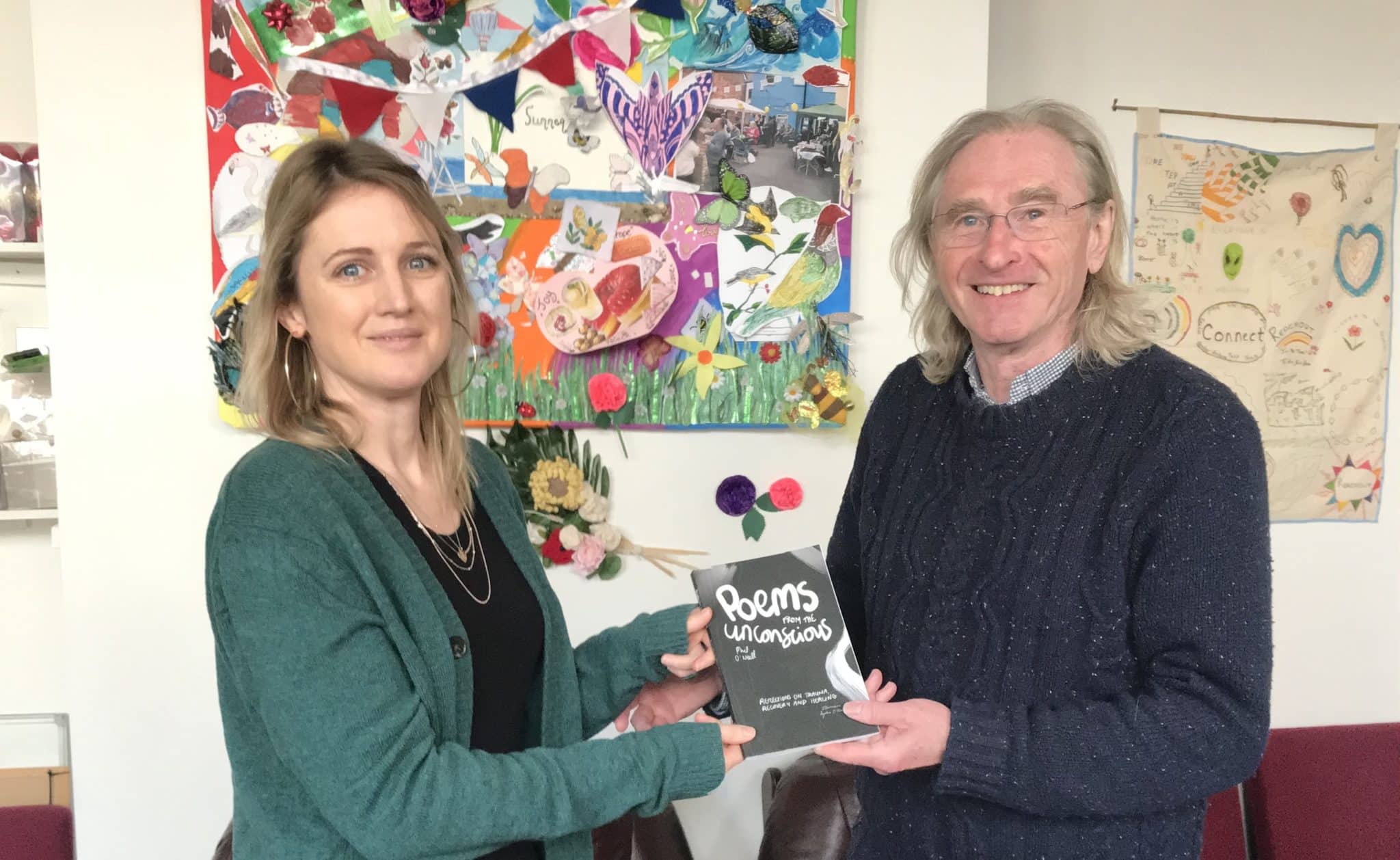Phil O’Neill is a local poet and author who has published his first collection of poems. Here he explains how his poetry helped him begin a journey of healing as he reflected on a personal trauma that stems from the dark past of his family…
Local poet, Phil O’Neill published his book of poetry, entitled Poems From the Unconscious, late last year after he experienced a period of depression which he says he was able to overcome through the power of writing.
The recent tome is a culmination of Phil’s work that stretches over the past 30 years and tackles themes of depression and transgenerational trauma that his family suffered decades ago.
Phil explains that his inspiration for the book came from his own experiences of mental health as well as emotional issues that had been handed down through his family.
“My paternal grandparents were imprisoned for child neglect in 1923. Their ten children ended up in different places, some on the streets,” he explains.
“My dad was put in an approved school and his two brothers, Dennis and Terry, were put in a foster home on a farm in Shropshire.
“Their foster parents abused my uncles and eventually Dennis was brutally beaten and starved to death aged just 12 in 1945.
“This was known as ‘The Story that took The War off The Front Pages’. It also led to a Parliamentary Inquiry and to changes in foster care through the Children Act of 1948.”
Phil also reveals that the events around Dennis’s death inspired Agatha Christie’s short radio play Three Blind Mice which the BBC commissioned her to write after a request from Queen Mary
“From this real life happening I took the idea for Three Blind Mice,” declared the legendary crime writer Agatha Christie at the time.
Phil says he believes that what happened to his uncle Dennis and his father’s family may still be affecting his own mental health decades later as transgenerational trauma.
“I came across the idea of transgenerational trauma and felt this explained the mental health issues my family faced as well as our behaviours.
“It’s believed that trauma can pass down the generations and can affect people who haven’t been directly involved in the events leading to the initial trauma.
“It has been documented in the descendants of slaves, war survivors, refugees, survivors of interpersonal abuse, and many other groups. It’s also particularly prevalent in victims of child abuse.
“The idea is that not only can someone experience trauma, they can then pass the symptoms and behaviours of trauma on to their children, who then might further pass these along the family line. A ripple effect, if you like.”
Phil wasn’t always writing poetry. He worked in marketing and general management for several years, obtaining a BA and MBA from London Business School.
He has worked in France, Italy and in the USA, but it was his love of poetry that eventually led him to do an MA in Creative writing at the University of Kent in 2017, at the age of 63.
Before embarking on the course, Phil found more than 300 poems he’d written in the 1990s, which boasted the proposed title of ‘Poems from the Unconscious’.
“It was fascinating to read those long-forgotten pieces, as well as discovering where I had written them – on payslips, boarding cards, meeting agendas, theatre tickets, faxes and most intriguingly, on the back of a speeding ticket!
“During my masters degree, my tutor presented her work about some terrible historical, medical events. Her poetry was breathtaking, and I immediately thought I should write about my family’s tragic past.
“Hopefully, I could turn my family’s history into a force for good through poetry and I was encouraged to do so by my tutor.
“In 2020, I became a trained Samaritan volunteer where I have received numerous calls from people with depressive illness and thought maybe poetry could help them.
“I decided I had enough material and a story to tell to develop the pamphlet into a book, with encouragement from my daughter, Agatha, who illustrated the book.”
It took Phil almost two years of writing and editing until he finally had a single collection of poems that combined his earlier experience of depression with his reflective processing of trauma many years later.
“The original poems relating to my depression were written while I was in a mental health crisis. The rawness of the experience is echoed in the naive, unstructured streams of internal monologue. I left them unedited in the book.
“The later poems were an attempt to write ‘good’ poetry about trauma, recovery and healing rather than attempting catharsis.”
Phil’s recently published work grapples with the strong emotions that surround trauma but uplifts them with reflections on his recovery and healing, including flickers of humour throughout.
The book also contains the only photos of his uncles to accompany one of his poems. He explains: “This is the only photo in existence of the three brothers who were first sent away together. Only two of them ended up at the farm: Dennis and Terry. Terry, who is still with us has since written a book entitled Someone to Love Us, which was published by HarperCollins in 2010.
“Agatha Christie’s The Mousetrap was originally called ‘Three Blind Mice’ which I think this photo illustrates alongside my poem, also titled ‘Three Blind Mice’.”
Phil hopes that Poems From the Unconscious will help others with mental health and he will donate all of the profits from his book to Mental Health Resource, a charity supporting wellbeing in Tunbridge Wells.
“I hope from reading my book, it will help those with depressive illness and an appreciation of art for art’s sake and the power of poetry in healing.”








